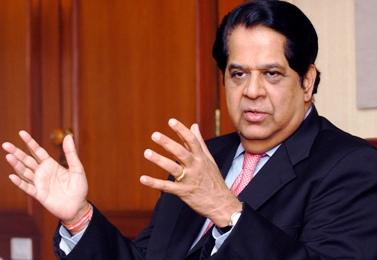
ICICI Bank & Infosys chairman K V Kamath says he expects things to improve vastly this year, with inflation peaking and interest rates set for a reversal.
In an interview with Business Standard, Kamath says he is surprised by the sharp correction in the stock markets and the rupee in an economy growing at seven per cent.
Edited excerpts:
. . .
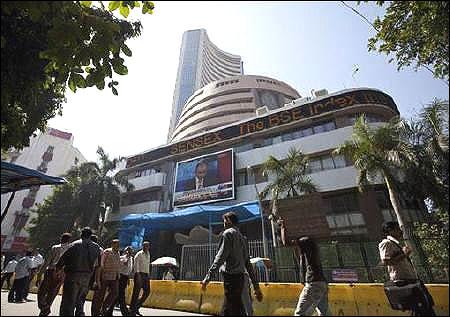
You are known to be an eternal optimist. Given the current mood, have you shed that tag?
I'm probably a contrarian.
It's true there is a very deep mood of negativity right now.
But if I look around, I see a number of positive things.
Inflation has peaked and the back of food inflation is clearly broken.
So, the interest rate cycle is now due for a correction.
These things will cause a change in sentiments and I expect that will be visible shortly. I'm more optimistic about 2012 than 2011.
. . .
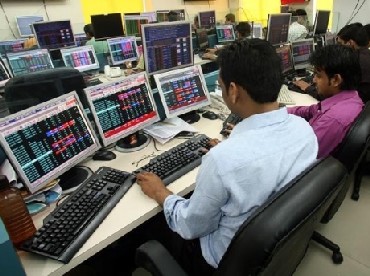
But, everybody is expecting 2012 to be worse than even 2008.
The growth rate has not fallen off the cliff. I don't think the stated growth will be anywhere less than seven per cent.
Then there is the unstated growth, which all of us tend to forget.
About consumer confidence, recently I spent 15 days in smaller towns and villages. There you find nobody exhibiting a negative mood to the extent we see in urban centres.
People were going about buying things, celebrating the New Year as if the negativity we are talking about does not exist.
. . .
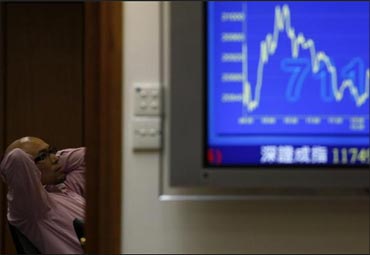
Bankers are worried about companies not coming with any fresh project proposals. When do you expect a revival in loan growth?
Infrastructure financing has completely dried and you will have to be a brave banker to fund infrastructure projects in the current environment.
The manufacturing sector has never been a heavy borrower and it continues to remain the same.
Today, Indian banks have various growth drivers.
There are growth opportunities in the corporate and retail sectors.
Then there is the government and the farm sector. I guess once we are back on the growth path, 20 per cent growth in assets will be possible.
. . .

How confident are you about the earnings growth of Indian companies in the coming quarters?
If we do a performance check of corporate India, we will see that in the last quarter, growth in profitability has indeed come down from 17 per cent to 13 per cent.
This was caused by higher raw material and labour costs, along with an increase in interest rates.
But, I think the top line still increased at a healthy rate and the growth remains positive.
So far, corporate India's overall performance does not signal any kind of fear.
The manufacturing sector is in self-financing mode to a large extent and doesn't need term financing at this point of time.
The services sector is still doing well. We had a better monsoon and the rural sector appears stable.
. . .

So, what is causing this negativity in sentiments?
I think in the minds of corporate India what is enveloping this gloom and negativity is the situation with the stock market.
My feeling is only 20-25 per cent investments, that were ought to happen, probably were throttled.
But the impact on the feel-good sentiment is disproportionate, probably 50-60 per cent. The stock market is at a level that is not giving corporates any leeway to do things that are needed.
It is virtually breaking the back of corporate India. I think once the economic numbers look up following a correction in the inflation level and drop in interest rates, the market will provide access to entrepreneurs to move and raise funds.
Only then will we see the same level of the animal spirit that all of us want to see.
Currently, the animal spirit is lacking.
. . .

What is needed to improve sentiments?
Sentiments are based on three factors.
The first is the state of the economy, inflation and interest rates.
Next comes policy action and the third is market conditions. In a way, all these factors are linked.
If you set the right interest rate and ease inflation, the capital market will improve.
We need to ask ourselves if the Indian market deserves to be one of the worst performers when the economy is still growing at a seven per cent-plus rate?
It means we have overreacted to the situation.
The government needs to speak up and say things are actually not as bad as they are made out to be.
They need to demonstrate their willingness to push reforms.
Along with this, policy action on interest rates will trigger some momentum in the market.
. . .
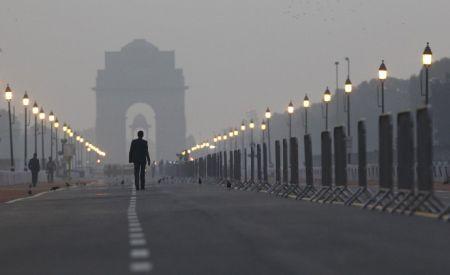
Which are the sectors that concern you?
The only thing that can upset the points I have made so far is infrastructure.
It can be a game-stopper.
There are three sectors that can cause some worry going forward. If no action is taken immediately, the power sector can be a concern in the next 12-18 months.
We should be prepared to pay higher cost per unit of power because the costs of coal, land, etc have gone up.
From a regulatory perspective, we need to respond quickly, understand, analyse and decide quickly whether to allow a higher cost per unit of power.
This is the single biggest worry at this point.
The other two areas are land acquisition and environment.
. . .

What is your outlook on the rupee?
I was surprised by the way the rupee weakened.
At 44, we may have appeared overvalued but the rapidity with which it moved to 47-48 and then further to 53-54 was surprising.
It depreciated almost 20 per cent in less than a quarter. It was clearly a reaction to the capital market and adverse news globally.
But, I think the exchange rate will reverse in the near term, and the next stop is around 48.
Again, I ask myself the question if the economy is growing at seven per cent then does it make sense for such a sharp depreciation in the rupee within a short period?
I'm struggling to find a rationale.
. . .
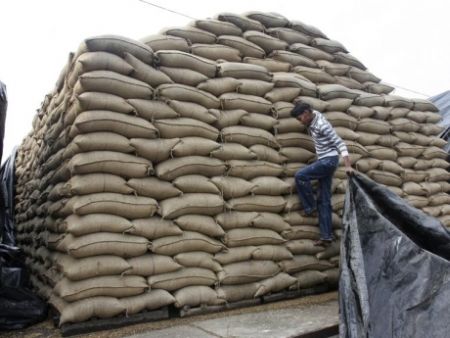
How do you see the stress on banks' asset quality in this environment?
I don't think from a systemic context, the stress in banks' balance sheets now is anywhere near the situation we had earlier.
Most of the stress is caused by an imbalance in interest rate or debts. Once you correct that imbalance, the stress is relieved.
History has shown that restructured assets in India come back fairly intact.
I don't think anyone is currently talking about stress in the quality of loans to manufacturing companies.
So, I think the fears are somewhat overstated.
While financial health issues for reasons like leveraging and interest rates have to be addressed, I don't think the current environment will cripple banks or their borrowers.
. . .
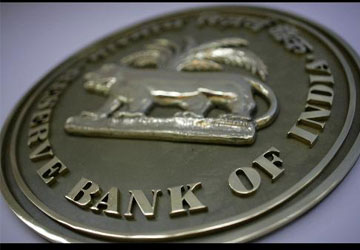
Do you think the Reserve Bank effected too many rate hikes and that led to this slowdown in credit demand?
The central bank was going through a cycle where almost double-digit inflation was staring it in the face.
Despite the rate hikes, inflation was just not responding.
So, it had to give what is conventional medicine.
We should not speculate whether it worked or not but I guess the central bank had no other option but to increase rates.
Now, as we see inflation easing, corrective steps on interest rates can be taken.
. . .
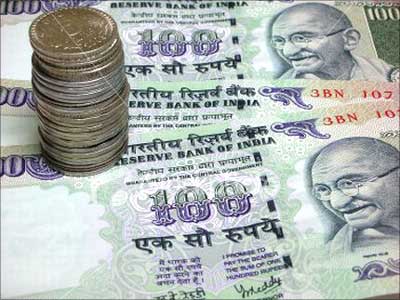
Are Indian banks looking to acquire some of the loan exposure of European banks in India?
If the pricing is right, the rating is right, then why not?
The risk-reward equation has to be correct and I'm sure Indian banks will look at this opportunity.
We believe we understand Indian risks better and have the capacity to absorb those risks.